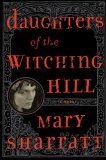Summary | Excerpt | Reading Guide | Reviews | Beyond the Book | Readalikes | Genres & Themes | Author Bio

Critics' Opinion:
Readers' Opinion:
First Published:
Apr 2010, 352 pages
Paperback:
Jan 2011, 352 pages
 Book Reviewed by:
Book Reviewed by:
BookBrowse First Impression Reviewers
Buy This Book
My natural father died some years back, happy and fat and rich.
His eldest son, my own half-brother, also named Roger, had become the new master
of Read Hall, part of it built from the very stones his grandfather’s
servants carted away from the ruined abbey. Younger than me, was my half-brother,
by some twenty years. Rarely did our paths cross, for the Nowells went to church
in Whalley with the other fine folk, never in the New Church in Goldshaw with
the yeomen and lesser gentry. But once, of a market day in Colne, I clapped
eyes on Roger Nowell. Impossible to miss him, the way he was sat like some
conquering knight upon his great Shire horse, blue-black and gleaming, with
red ribbons twisted in its mane. That was some years ago, when my half-brother’s
face was yet smooth and unlined. A handsome man, he was, with a firm chin just
like mine. I looked straight at him to see if he would recognise his own blood
kin. But his sharp blue eyes passed over me as though I was nowt but a heap
of dung.
Over the years he’d become a mighty man: Magistrate and
Justice of the Peace. We in Pendle Forest were careful not to cross him or
give him cause for offence. On account of my being a poor widow, he granted
me a begging license. Did it through Constable without speaking a word to me.
And so I was left to wander the tracks of Pendle Forest and wheedle, full humble,
for food and honest work.
But gone were the days when Christian folk felt beholden to give
alms to the poor. When I was a tiny girl, the monks of Whalley Abbey fed and
clothed the needy. So did the rich folk, for their souls would languish a fair
long time in purgatory if they were stingy to us. In the old days, the poor
were respected—our prayers were dearer to God than those of the wealthy.
Many a well-to-do man on his deathbed would give out food and alms to the lowliest
of the parish, so my mam had told me, if they would only pray for his immortal
soul. At his funeral, the poor were given doles of bread and soul cakes.
The reformers said that purgatory was heresy: it was either heaven
for the Elect or hell for everyone else, so what need did the rich have to
bribe the poor to pray for them? We humble folk were no longer seen as blessed
of the Lord but as a right nuisance. When I went begging for a mere bowl of
blue milk or a handful of oats to make water porridge, the Hargreaves and the
Bannisters and the Mittons narrowed their eyes and said my hard lot was God’s
punishment for my sin of bearing a bastard child. Mean as stones, they were.
Little did they know. Liza, my lawful-begotten child, was deformed because
her father, my husband, gave me no pleasure to speak of, whilst Kit, my bastard,
borne of passion and desire, was as tall and beautiful and perfect in form
as any larch tree. Ah, but the Puritans would only see what they wanted to
see. Most so-called charity they doled out was to give me half a loaf of old
bread in exchange for a day laundering soiled clouts.
But I’d even forgive them for that if they hadn’t
robbed my life of its solace and joy. In the old days, we’d a saint for
every purpose: Margaret for help in childbirth, Anne for protection in storms,
Anthony to ward against fire, George to heal horses and protect them from witchcraft.
Old King Henry forbade us to light candles before the saints but at least he
let us keep their altars. In the old days, no one forced us to go to church
either, even for Easter communion. The chapel nave belonged to us, the ordinary
people, and it was the second home we all shared. Dividing the nave from the
chancel with the high altar was the carved oak roodscreen which framed the
priest as he sang out the mass. We didn’t stand solemn and dour during
the holy service, either, but wandered about the nave, from one saint’s
altar to the next, gazing at the pictures and statues, till the priest rang
the bell, then held up the Host for all to see, the plain wafer transformed
in a glorious miracle into the body and blood of Christ. Just laying eyes upon
the Host was enough to ward a person from witchcraft, plague, and sudden death.
Excerpted from Daughters of the Witching Hill by Mary Sharratt. Copyright © 2010 by Mary Sharratt. Excerpted by permission of Houghton Mifflin. All rights reserved. No part of this excerpt may be reproduced or reprinted without permission in writing from the publisher.





The Funeral Cryer by Wenyan Lu
Debut novelist Wenyan Lu brings us this witty yet profound story about one woman's midlife reawakening in contemporary rural China.
Your guide toexceptional books
BookBrowse seeks out and recommends the best in contemporary fiction and nonfiction—books that not only engage and entertain but also deepen our understanding of ourselves and the world around us.